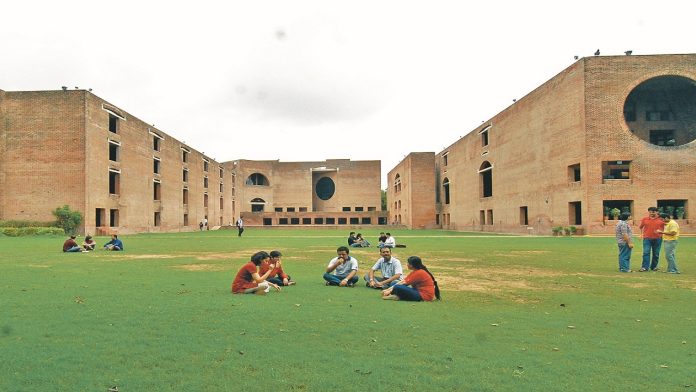The Indian Institutes of Management (Amendment) Bill, 2023, was passed on August 4 by the Lok Sabha. It proposes amendments to the Indian Institutes of Management Act, 2017, including increased presidential powers at these premier management institutes.
The Bill has proposed that the president will be the Visitor of IIMs with the power to audit their functioning, order probes and appoint as well as remove directors. This has raised concerns over the balance between accountability and autonomy of these institutes.
The amendment declares the 20 IIMs as “institutions of national importance”. Section 10A says that the president shall be the Visitor of every Institute. The Visitor may appoint one or more persons to review the work and progress of any Institute and hold inquiries into their affairs and to report in such manner as the Visitor may direct. The Board may also recommend to the Visitor an inquiry as deemed proper against an Institute which has not been functioning in accordance with the provisions and objectives of the Act. Upon receipt of any such report referred to in sub-section (2), the Visitor may take action and issue directions he considers necessary. The Institute is bound to comply with such directions.
Section 12, sub-section 1A of the Act says that notwithstanding anything contained in this Section, an outgoing member shall, unless the Board otherwise directs, continue in office until another person is appointed or nominated in his place.
In Section 16, Sub-section (2), the words “appointed by the Board, on such terms”, have been substituted with “appointed by the Board with prior approval of the Visitor, in such manner and subject to such terms”. Sub-section (3) says: The Director shall be appointed out of the panel of names recommended by a search-cum-selection committee to be constituted by the Board consisting of the chairperson of the Board, who shall be the Chairperson of the search-cum-selection committee; one member to be nominated by the Visitor and two members to be chosen from among eminent administrators, industrialists, educationists, scientists, technocrats and management specialists. In Sub-section (7), the words “The Board may remove from office the Director” have been replaced with “The Board, with prior approval of the Visitor, may remove from office the Director”. In Sub-section (10), the services of the Director may be terminated by the Visitor, in such manner as may be prescribed.
Some of the other salient features of the Indian Institutes of Management (Amendment) Bill, 2023, are: The National Institute of Industrial Engineering, Mumbai, shall be called IIM Mumbai, and all the provisions of the Indian Institutes of Management Act, 2017, shall apply; the chairperson of the Board of Governors shall be nominated by the Visitor and to empower the government to constitute an interim Board in case of suspension or dissolution of the said Board of Governors; insertion of a new Section 10A to provide that the president shall be the Visitor of every Institute; amend Section 16 of the Act to provide that the Director of the Institute shall be appointed out of a panel of names recommended by a search-cum-selection committee to be constituted by the Board consisting of such members as mentioned in sub-section (3); amend Section 29 relating to “Coordination Forum of the Institute” so as to provide that an eminent person to be nominated by the Visitor shall be the chairperson of the said Forum.
Clause 11 of the IIM (Amendment) Bill, 2023 relates to amendment of Section 34 which empowers the government to make rules in respect of certain matters mentioned in the Act, namely: The conditions and the procedure subject to which the Board may be suspended or dissolved under Sub-section (6) of Section 10; the procedure to be adopted for selection of Director and the manner of termination of his services.
The first two IIMs in the country—Calcutta and Ahmedabad—were set up in 1961. They were envisaged for increasing the pace of management training and education in India. As the demand for more such institutions grew, four more IIMs were established in Bangalore, Lucknow, Indore and Kozhikode. In the Eleventh Plan, seven more were added at Shillong, Ranchi, Rohtak, Raipur, Kashipur, Tiruchirappalli and Udaipur. During 2015-16, seven more IIMs were set up—at Amritsar, Bodh Gaya, Jammu, Nagpur, Sambalpur, Sirmaur and Visakhapatnam. Subsequently, the Act enabled the Institutes to grant degrees, made governance uniform and enabled the Board to exercise academic autonomy.
The National Institute of Industrial Engineering, Mumbai, which was established in 1963, was well known for its techno-managerial strength and contribution to the country’s economic growth. However, as the Institute was not part of any Act of Parliament, it experienced several challenges. Despite consistently being among top management institutes in the country, it was unable to grant degrees, thereby affecting the prospects of all stakeholders of the Institute, especially the students. Such limitations shall be addressed once the Institute comes under the purview of the Act, as it shall be able to grant degrees similar to that of all IIMs.
The National Institute of Industrial Engineering, Mumbai has been allocated Rs 65 crore as grants-in-aid for 2022-23. It shall be provided a grant-in-aid of Rs 80 crore for a period of one year after becoming IIM Mumbai. After one year, no grants-in-aid support will be extended and it will generate funds through additional internal accruals.
—By Adarsh Kumar and India Legal Bureau


